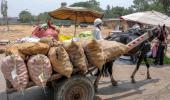'The package is for the distressed farmers who are committing suicide due to the severe drought,' Nitin Gadkari tells Arup Roy Choudhury and Sanjeeb Mukherjee.

Photograph: Rediff.com/Uttam Ghosh
The Centre is considering a Rs 200 billion irrigation package for drought-hit areas of Maharashtra, which see the highest incidents of farmer suicides in the country.
The package, which is expected to be announced soon, will provide funds for completion of 108 major and minor stalled irrigation projects in the state.
These projects, located in drought-prone as well as other areas, are those where 50 per cent of the work has been completed and the project has been stalled since then.
On completion of the projects, an extra 7.75 lakh hectares of land will come under irrigation in the state.
Around 75 per cent or Rs 150 billion of the funding for this package will come from the National Bank for Agriculture and Rural Development (NABARD)'s long-term irrigation fund while the remaining Rs 50 billion is expected to come from the Centre's coffers, Union Road Transport and Highways Minister Nitin Gadkari said.
"It (the package) is for the distressed farmers who are committing suicide due to the severe drought. A formal Cabinet note on the same is expected to be moved soon," Gadkari, who is spearheading the initiative, said.
Gadkari said the need for the package arose due to the previous state government starting 108 irrigation projects for which there was still a requirement of almost Rs 5,000 billion.
"We need money for these projects. The chief minister (Devendra Fadnavis) had sought funds for it and we are arranging it," he said.
A long-term irrigation fund was set up in NABARD with an initial corpus of Rs 200 billion. It was later increased to Rs 400 billion.
In the 2018-2019 Budget, it was announced that the scope of the fund would be expanded to cover specified command area development projects.
Maharashtra has miserable irrigation cover of just around 18 per cent as against the national average of 48 per cent cover.
In the years 2014 and 2015, India witnessed the fourth consecutive drought in the last 115 years since 1900.
An ICRIER working paper, quoting ministry of water resources data, showed that around 68 per cent of the country is prone to drought in varying degrees.
Of this, 35 per cent is drought prone (annual rainfall between 750 mm to 1125 mm) while 33 per cent is chronically drought prone (annual rainfall is less than 750 mm).
The Marathwada region of Maharashtra is one such chronically drought-prone region which faced acute water shortage in the 2014-2015 and 2015-2016 droughts, with an annual rainfall deficiency of 33 per cent and 35 per cent respectively, the ICRIER paper said.
Such was the intensity of the drought that the state government had to run special trains called 'Jaldoot Express' to transport almost 2,595 lakh litres of water to the Latur district of Marathwada at a state expenditure of Rs 52.3 million in order to meet the drinking water shortage of the region.
Handling the water crisis in Maharashtra has been one of major aims of the BJP-ruled state government.











